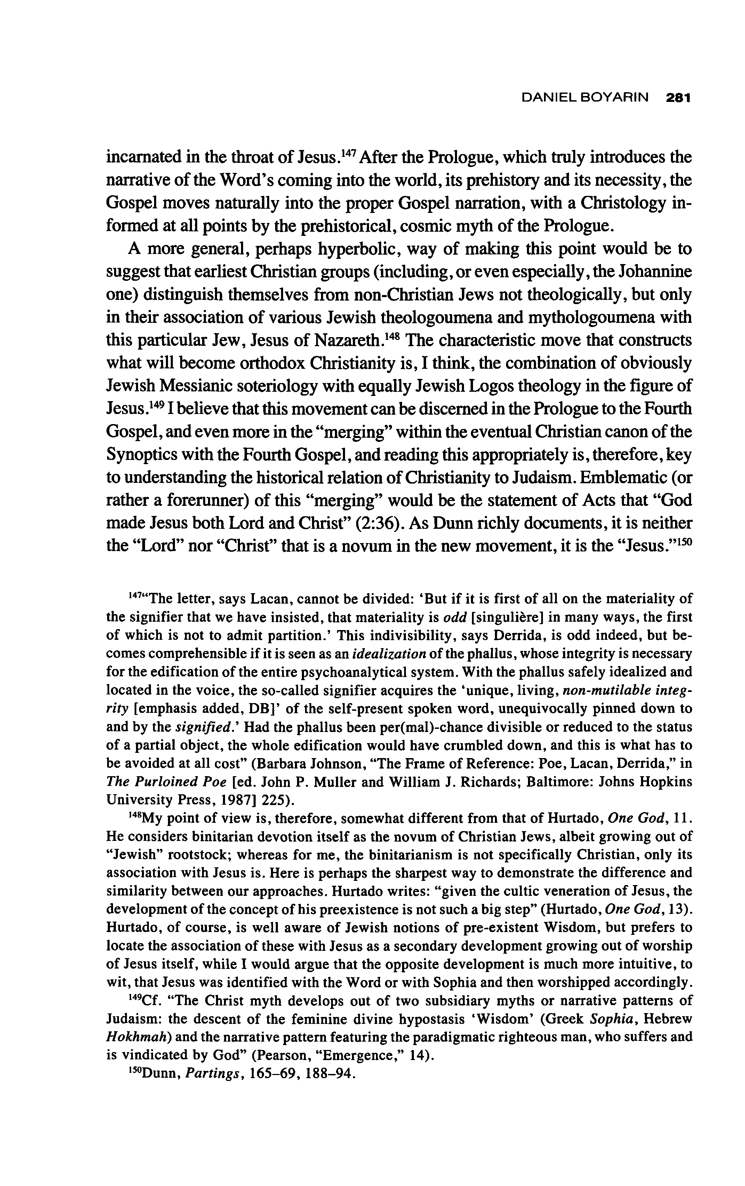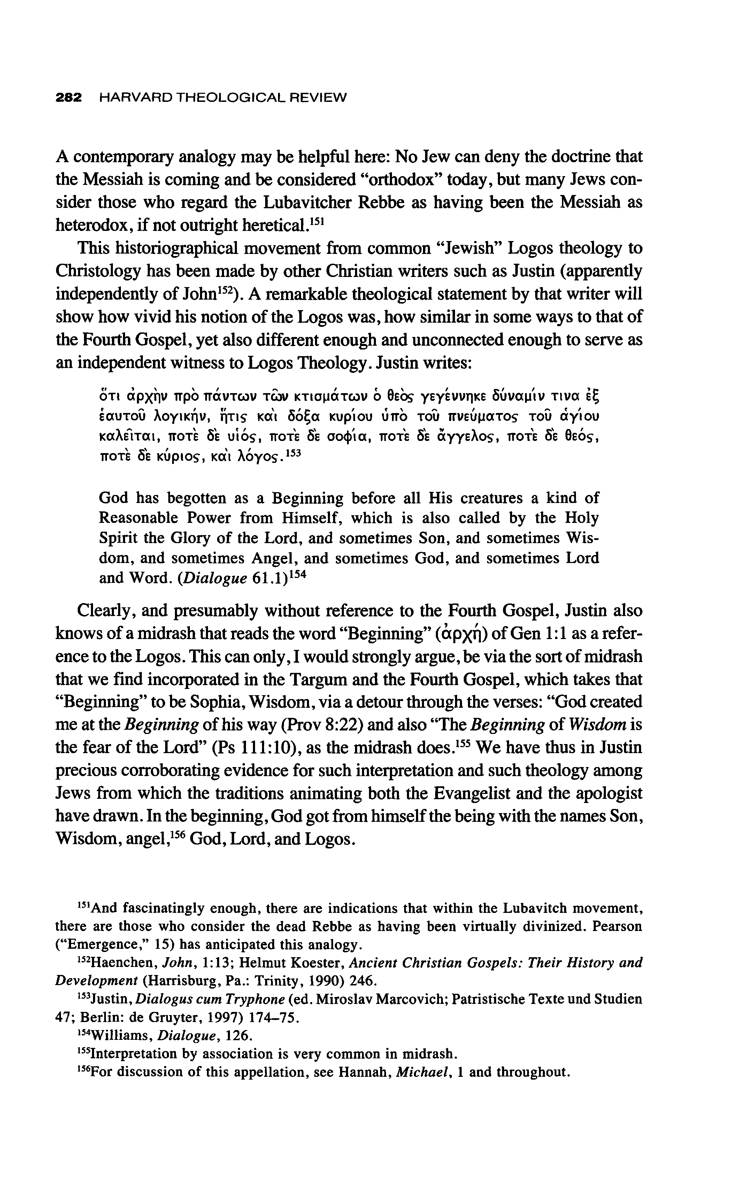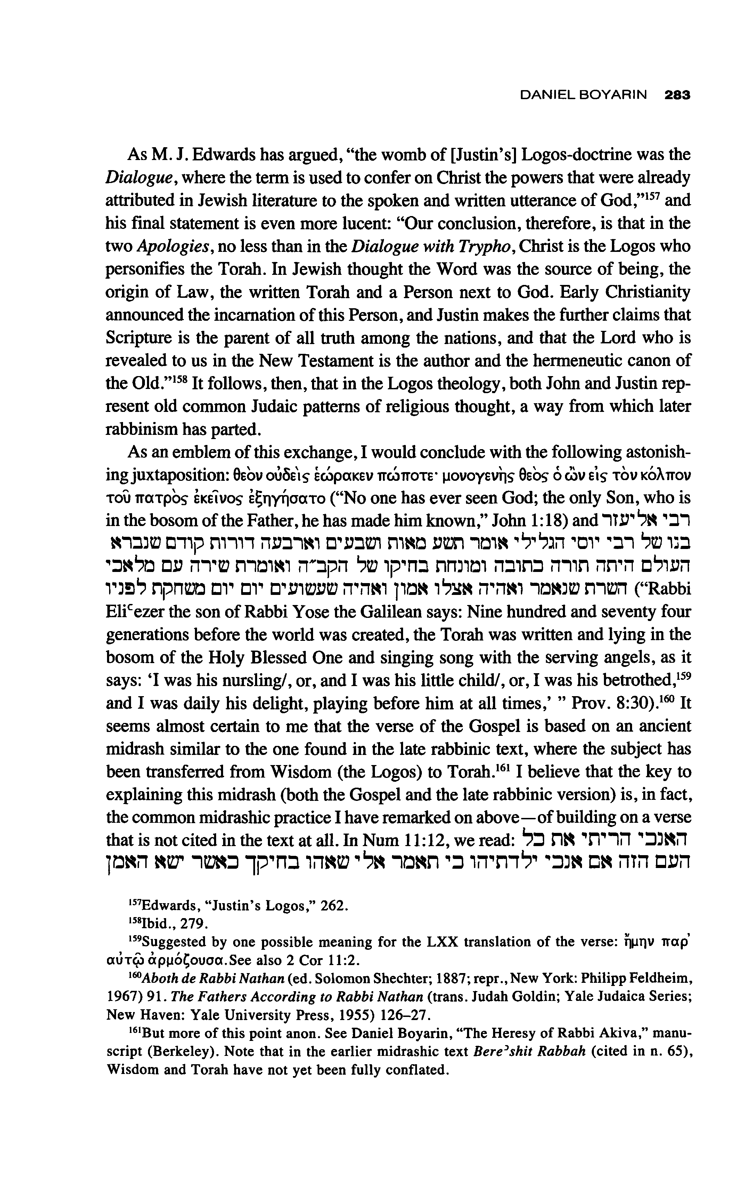to Christian developments.
145"From other references in the [fourth] gospel the reader can then be led to see that what
the Torah was intended to, but could not, effect has been effected in Jesus" (John Suggit,
"John XVII. 17. Ο ΛΟΓΟΣ Ο ΣΟΣ ΑΛΗΘΕΙΑ ΕΣΤΙΝ," JTS 35 [1984] 107).
146Jacques Derrida, Of Grammatology (Baltimore: Johns Hopkins University Press, 1976).
Contrast here the reading of Epp ("Wisdom," 140-41), who would inscribe a much more
stringent contrast between Matthew's and John's views of the Torah than I would.

D A N I E L B O Y A R Í N 2 8 1
incarnated in the throat of Jesus.147 After the Prologue, which truly introduces the
narrative of the Word's coming into the world, its prehistory and its necessity, the
Gospel moves naturally into the proper Gospel narration, with a Christology in-
formed at all points by the prehistorical, cosmic myth of the Prologue.
A more general, perhaps hyperbolic, way of making this point would be to
suggest that earliest Christian groups (including, or even especially, the Johannine
one) distinguish themselves from non-Christian Jews not theologically, but only
in their association of various Jewish theologoumena and mythologoumena with
this particular Jew, Jesus of Nazareth.148 The characteristic move that constructs
what will become orthodox Christianity is, I think, the combination of obviously
Jewish Messianic soteriology with equally Jewish Logos theology in the figure of
Jesus.1491 believe that this movement can be discerned in the Prologue to the Fourth
Gospel, and even more in the "merging" within the eventual Christian canon of the
Synoptics with the Fourth Gospel, and reading this appropriately is, therefore, key
to understanding the historical relation of Christianity to Judaism. Emblematic (or
rather a forerunner) of this "merging" would be the statement of Acts that "God
made Jesus both Lord and Christ" (2:36). As Dunn richly documents, it is neither
the "Lord" nor "Christ" that is a novum in the new movement, it is the "Jesus."150
147"The letter, says Lacan, cannot be divided: 'But if it is first of all on the materiality of
the signifier that we have insisted, that materiality is odd [singulière] in many ways, the first of which is not to admit partition.' This indivisibility, says Derrida, is odd indeed, but becomes comprehensible if it is seen as an idealization of the phallus, whose integrity is necessary for the edification of the entire psychoanalytical system. With the phallus safely idealized and
located in the voice, the so-called signifier acquires the 'unique, living, non-mutilable integ-
rity [emphasis added, DB]' of the self-present spoken word, unequivocally pinned down to
and by the signified. ' Had the phallus been per(mal)-chance divisible or reduced to the status
of a partial object, the whole edification would have crumbled down, and this is what has to
be avoided at all cost" (Barbara Johnson, "The Frame of Reference: Poe, Lacan, Derrida," in
The Purloined Poe [ed. John P. Müller and William J. Richards; Baltimore: Johns Hopkins
University Press, 1987] 225).
148My point of view is, therefore, somewhat different from that of Hurtado, One God, 11.
He considers binitarian devotion itself as the novum of Christian Jews, albeit growing out of
"Jewish" rootstock; whereas for me, the binitarianism is not specifically Christian, only its
association with Jesus is. Here is perhaps the sharpest way to demonstrate the difference and
similarity between our approaches. Hurtado writes: "given the cultic veneration of Jesus, the
development of the concept of his préexistence is not such a big step" (Hurtado, One God, 13).
Hurtado, of course, is well aware of Jewish notions of pre-existent Wisdom, but prefers to
locate the association of these with Jesus as a secondary development growing out of worship
of Jesus itself, while I would argue that the opposite development is much more intuitive, to
wit, that Jesus was identified with the Word or with Sophia and then worshipped accordingly.
149Cf. "The Christ myth develops out of two subsidiary myths or narrative patterns of
Judaism: the descent of the feminine divine hypostasis 'Wisdom' (Greek Sophia, Hebrew
Hokhmah) and the narrative pattern featuring the paradigmatic righteous man, who suffers and
is vindicated by God" (Pearson, "Emergence," 14).
150Dunn, Partings, 165-69, 188-94.

2 8 2 HARVARD T H E O L O G I C A L REVIEW
A contemporary analogy may be helpful here: No Jew can deny the doctrine that
the Messiah is coming and be considered "orthodox" today, but many Jews consider those who regard the Lubavitcher Rebbe as having been the Messiah as heterodox, if not outright heretical.151
This historiographical movement from common "Jewish" Logos theology to
Christology has been made by other Christian writers such as Justin (apparently
independently of John152). A remarkable theological statement by that writer will
show how vivid his notion of the Logos was, how similar in some ways to that of
the Fourth Gospel, yet also different enough and unconnected enough to serve as
an independent witness to Logos Theology. Justin writes:
ότι αρχήν προ πάντων των κτισμάτων ó θεό? γεγέννηκε δύναμΊυ τίνα εξ
εαυτού λογικήν, ητι$ και δόξα κυρ'ιου υπό του πνεύματος του άγ'ιου
καλείται, ποτέ δε uióc, ποτέ δε σοφία, ποτέ δε άγγελος, ποτέ δε 0ÊOS,
ποτέ δε Kupios, και Xóyos.153
God has begotten as a Beginning before all His creatures a kind of
Reasonable Power from Himself, which is also called by the Holy
Spirit the Glory of the Lord, and sometimes Son, and sometimes Wis-
dom, and sometimes Angel, and sometimes God, and sometimes Lord
and Word. (Dialogue 61.1)154
Clearly, and presumably without reference to the Fourth Gospel, Justin also
knows of a midrash that reads the word "Beginning" (αρχή) of Gen 1:1 as a reference to the Logos. This can only, I would strongly argue, be via the sort of midrash that we find incorporated in the Targum and the Fourth Gospel, which takes that
"Beginning" to be Sophia, Wisdom, via a detour through the verses: "God created
me at the Beginning of his way (Prov 8:22) and also "The Beginning of Wisdom is the fear of the Lord" (Ps 111:10), as the midrash does.155 We have thus in Justin
precious corroborating evidence for such interpretation and such theology among
Jews from which the traditions animating both the Evangelist and the apologist
have drawn. In the beginning, God got from himself the being with the names Son,
Wisdom, angel,156 God, Lord, and Logos.
151And fascinatingly enough, there are indications that within the Lubavitch movement,
there are those who consider the dead Rebbe as having been virtually divinized. Pearson
("Emergence," 15) has anticipated this analogy.
152Haenchen, John, 1:13; Helmut Koester, Ancient Christian Gospels: Their History and
Development (Harrisburg, Pa.: Trinity, 1990) 246.
153Justin, Dialogus cum Tryphone (ed. Miroslav Marcovich; Patristische Texte und Studien
47; Berlin: de Gruyter, 1997) 174-75.
154Williams, Dialogue, 126.
155Interpretation by association is very common in midrash.
156For discussion of this appellation, see Hannah, Michael, 1 and throughout.

DANIEL B O Y A R Í N 2 8 3
As M. J. Edwards has argued, "the womb of [Justin's] Logos-doctrine was the
Dialogue, where the term is used to confer on Christ the powers that were already
attributed in Jewish literature to the spoken and written utterance of God,"157 and
his final statement is even more lucent: "Our conclusion, therefore, is that in the
two Apologies, no less than in the Dialogue with Trypho, Christ is the Logos who personifies the Torah. In Jewish thought the Word was the source of being, the
origin of Law, the written Torah and a Person next to God. Early Christianity
announced the incarnation of this Person, and Justin makes the further claims that
Scripture is the parent of all truth among the nations, and that the Lord who is
revealed to us in the New Testament is the author and the hermeneutic canon of
the Old."158 It follows, then, that in the Logos theology, both John and Justin rep-
resent old common Judaic patterns of religious thought, a way from which later






